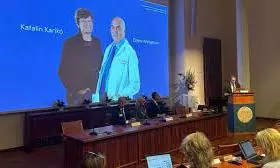
Katalin Kariko and Drew Weissman awarded Nobel Prize in medicine for mRNA technology contribution
text_fieldsStockholm: Katalin Kariko and Drew Weissman have been awarded the Nobel Prize in Medicine for their groundbreaking work on messenger RNA (mRNA) technology, which played a pivotal role in the rapid development of Covid-19 vaccines.
The Nobel committee in Stockholm recognised their contributions, stating that they "contributed to the unprecedented rate of vaccine development during one of the greatest threats to human health in modern times."
Breaking from tradition, the Nobel committee acknowledged research from the relatively recent past, as the award-winning science dates back to 2005.
The mRNA technology, which underpinned the Covid-19 vaccines developed by Pfizer/BioNTech and Moderna, represents a significant departure from conventional vaccines. Rather than using weakened viruses or key viral proteins, mRNA vaccines provide genetic instructions to cells, instructing them to produce proteins that simulate an infection and train the immune system to respond effectively.
While the concept of mRNA vaccines was first demonstrated in 1990, it wasn't until the mid-2000s that Kariko and Weissman developed a technique to control the potentially dangerous inflammatory response observed in animals exposed to these genetic molecules. This breakthrough paved the way for the safe development of mRNA vaccines for human use.
Kariko and Weissman's mRNA technology is now extending beyond Covid-19 vaccines to the development of treatments for various diseases, including cancer, influenza, and heart failure.
The Nobel Prize in Medicine consists of a diploma, a gold medal, and a $1 million cash award, which the recipients will receive from King Carl XVI Gustaf at a formal ceremony in Stockholm on December 10, coinciding with the anniversary of Alfred Nobel's death in 1896.
Nobel, the inventor and philanthropist, established the prizes in his last will and testament to honour those who have made outstanding contributions to humanity.
While Nobel Prizes have faced criticism in the past for a lack of gender and geographical diversity among recipients, the committees responsible for the awards have been working to address these issues. This week, the Nobel season continues with the announcement of winners in physics and chemistry, followed by literature and peace prizes. The Economics Prize will conclude the awards on October 9.
Possible recipients for the Peace Prize include Iranian women protesting against strict dress codes and organisations documenting war crimes in Ukraine. Climate change has also been suggested as a focus for the Peace Prize due to the ongoing global climate crisis.
In the Physics Prize category, potential winners include discoveries related to twisted graphene, the IceCube Neutrino Observatory in Antarctica, and advancements in high-density data storage through spintronics.
Kariko and Weissman join the prestigious ranks of Nobel laureates, having previously received accolades such as the Lasker Award in 2021, often seen as a precursor to the Nobel Prize. Their pioneering work has not only transformed the field of medicine but also played a pivotal role in the global battle against the Covid-19 pandemic.























